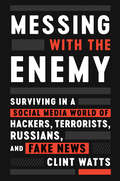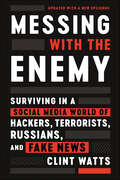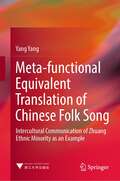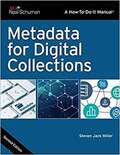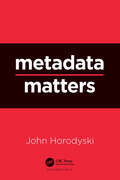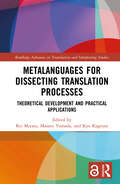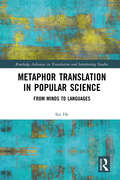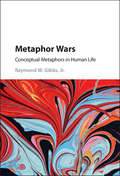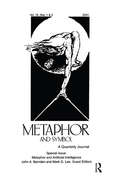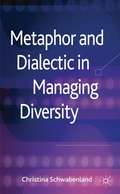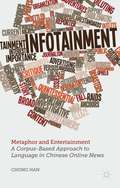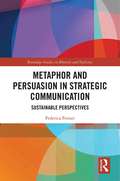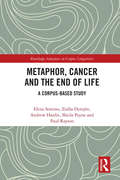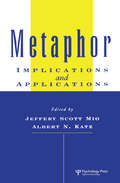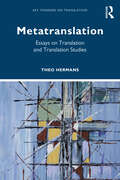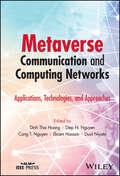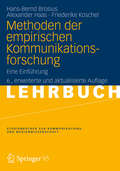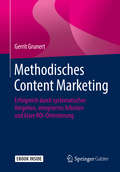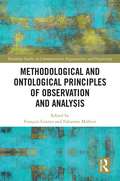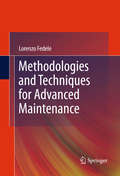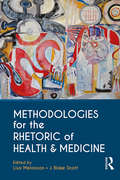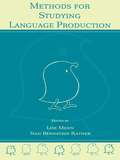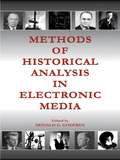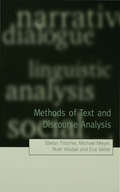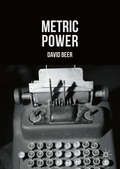- Table View
- List View
Messing with the Enemy: Surviving in a Social Media World of Hackers, Terrorists, Russians, and Fake News
by Clint WattsA former FBI Special Agent and leading cyber-security expert offers a devastating and essential look at the misinformation campaigns, fake news, and electronic espionage operations that have become the cutting edge of modern warfare—and how we can protect ourselves and our country against them.Clint Watts electrified the nation when he testified in front of the House Intelligence Committee regarding Russian interference in the 2016 election. In Messing with the Enemy, the cyber and homeland security expert introduces us to a frightening world in which terrorists and cyber criminals don’t hack your computer, they hack your mind. Watts reveals how these malefactors use your information and that of your friends and family to work for them through social media, which they use to map your social networks, scour your world affiliations, and master your fears and preferences.Thanks to the schemes engineered by social media manipulators using you and your information, business executives have coughed up millions in fraudulent wire transfers, seemingly good kids have joined the Islamic State, and staunch anti-communist Reagan Republicans have cheered the Russian government’s hacking of a Democratic presidential candidate’s e-mails. Watts knows how they do it because he’s mirrored their methods to understand their intentions, combat their actions, and coopt their efforts.Watts examines a particular social media platform—from Twitter to internet Forums to Facebook to LinkedIn—and a specific bad actor—from al Qaeda to the Islamic State to the Russian and Syrian governments—to illuminate exactly how social media tracking is used for nefarious purposes. He explains how he’s learned, through his successes and his failures, to engage with hackers, terrorists, and even the Russians—and how these interactions have generated methods of fighting back. Shocking, funny, and eye-opening, Messing with the Enemy is a deeply urgent guide for living safe and smart in a super-connected world.
Messing with the Enemy: Surviving in a Social Media World of Hackers, Terrorists, Russians, and Fake News
by Clint WattsA former FBI Special Agent and leading cyber-security expert offers a devastating and essential look at the misinformation campaigns, fake news, and electronic espionage operations that have become the cutting edge of modern warfare—and how we can protect ourselves and our country against them.Clint Watts electrified the nation when he testified in front of the House Intelligence Committee regarding Russian interference in the 2016 election. In Messing with the Enemy, the cyber and homeland security expert introduces us to a frightening world in which terrorists and cyber criminals don’t hack your computer, they hack your mind. Watts reveals how these malefactors use your information and that of your friends and family to work for them through social media, which they use to map your social networks, scour your world affiliations, and master your fears and preferences.Thanks to the schemes engineered by social media manipulators using you and your information, business executives have coughed up millions in fraudulent wire transfers, seemingly good kids have joined the Islamic State, and staunch anti-communist Reagan Republicans have cheered the Russian government’s hacking of a Democratic presidential candidate’s e-mails. Watts knows how they do it because he’s mirrored their methods to understand their intentions, combat their actions, and coopt their efforts.Watts examines a particular social media platform—from Twitter to internet Forums to Facebook to LinkedIn—and a specific bad actor—from al Qaeda to the Islamic State to the Russian and Syrian governments—to illuminate exactly how social media tracking is used for nefarious purposes. He explains how he’s learned, through his successes and his failures, to engage with hackers, terrorists, and even the Russians—and how these interactions have generated methods of fighting back. Shocking, funny, and eye-opening, Messing with the Enemy is a deeply urgent guide for living safe and smart in a super-connected world.
Meta-functional Equivalent Translation of Chinese Folk Song: Intercultural Communication of Zhuang Ethnic Minority as an Example
by Yang YangThis book brings audiences the enchanting melodies passing down from generation to generation in the Zhuang community, which are on the brink of extinction. Specifically, it sheds light on the origin, evolution and artistic features of Zhuang folk song in the first place, and then it shifts to their English translation based on meta-functional equivalence, through which the multi-aesthetics of Zhuang folk song have been represented. At length, forty classic Zhuang folk songs have been selected, and each could be sung bilingually in line with the stave.This book benefits researchers and students who are interested in music translation as well as the Zhuang ethnic music, culture and literature. It also gives readers an insight into musicology, anthropology and intercultural study.
Metadata For Digital Collections (How-to-do-it Manuals Ser.)
by Steven Jack MillerSince it was first published, LIS students and professionals everywhere have relied on Miller’s authoritative manual for clear instruction on the real-world practice of metadata design and creation. Now the author has given his text a top to bottom overhaul to bring it fully up to date, making it even easier for readers to acquire the knowledge and skills they need, whether they use the book on the job or in a classroom. By following this book’s guidance, with its inclusion of numerous practical examples that clarify common application issues and challenges, readers will learn about the concept of metadata and its functions for digital collections, why it’s essential to approach metadata specifically as data for machine processing, and how metadata can work in the rapidly developing Linked Data environment; know how to create high-quality resource descriptions using widely shared metadata standards, vocabularies, and elements commonly needed for digital collections; become thoroughly familiarized with Dublin Core (DC) through exploration of DCMI Metadata Terms, CONTENTdm best practices, and DC as Linked Data; discover what Linked Data is, how it is expressed in the Resource Description Framework (RDF), and how it works in relation to specific semantic models (typically called “ontologies”) such as BIBFRAME, comprised of properties and classes with “domain” and “range” specifications; get to know the MODS and VRA Core metadata schemes, along with recent developments related to their use in a Linked Data setting; understand the nuts and bolts of designing and documenting a metadata scheme; and gain knowledge of vital metadata interoperability and quality issues, including how to identify and clean inconsistent, missing, and messy metadata using innovative tools such as OpenRefine.
Metadata Matters
by John Horodyski"In what is certain to be a seminal work on metadata, John Horodyski masterfully affirms the value of metadata while providing practical examples of its role in our personal and professional lives. He does more than tell us that metadata matters—he vividly illustrates why it matters." —Patricia C. Franks, PhD, CA, CRM, IGP, CIGO, FAI, President, NAGARA, Professor Emerita, San José State University, USA If data is the language upon which our modern society will be built, then metadata will be its grammar, the construction of its meaning, the building for its content, and the ability to understand what data can be for us all. We are just starting to bring change into the management of the data that connects our experiences. Metadata Matters explains how metadata is the foundation of digital strategy. If digital assets are to be discovered, they want to be found. The path to good metadata design begins with the realization that digital assets need to be identified, organized, and made available for discovery. This book explains how metadata will help ensure that an organization is building the right system for the right users at the right time. Metadata matters and is the best chance for a return on investment on digital assets and is also a line of defense against lost opportunities. It matters to the digital experience of users. It helps organizations ensure that users can identify, discover, and experience their brands in the ways organizations intend. It is a necessary defense, which this book shows how to build.
Metalanguages for Dissecting Translation Processes: Theoretical Development and Practical Applications (Routledge Advances in Translation and Interpreting Studies)
by Rei MiyataThis edited volume covers the development and application of metalanguages for concretely describing and communicating translation processes in practice. In a modern setting of project-based translation, it is crucial to bridge the gaps between various actors involved in the translation process, especially among clients, translation service providers (TSPs), translators, and technology developers. However, we have been confronted with the lack of common understanding among them about the notion and detailed mechanisms of translation. Against this backdrop, we are developing systematic, fine-grained metalanguages that are designed to describe and analyse translation processes in concrete terms. Underpinned by the rich accumulation of theoretical findings in translation studies and established standards of practical translation services, such as ISO 17100, our metalanguages extensively cover the core processes in translation projects, namely project management, source document analysis, translation, and revision. Gathering authors with diverse backgrounds and expertise, this book proffers the fruits of the contributors’ collaborative endeavour; it not only provides practicable metalanguages, but also reports on wide-ranging case studies on the application of metalanguages in practical and pedagogical scenarios. This book supplies concrete guidance for those who are involved in the translation practices and translation training/education. In addition to being of practical use, the metalanguages reflect explication of the translation process. As such, this book provides essential insights for researchers and students in the field of translation studies. The up-to-date versions of the metalanguages, related materials, and the corrigendum for the book content are available on our project website: https://tntc-project.github.io
Metaphor Translation in Popular Science: From Minds to Languages (Routledge Advances in Translation and Interpreting Studies)
by Sui HeThis book explores the intersection of metaphor studies and translation studies, specifically focusing on popular scientific articles.The volume complements existing work on conceptual metaphor theory in translation by aligning it with conceptual blending theory to demonstrate how an integrated approach offers a more expansive understanding of the cognitive and linguistic dimensions of metaphor translation. It includes an essential introduction to the key concepts and theories in metaphor studies and metaphor translation research, discerning the importance of localising theories from neighbouring disciplines, such as metaphor studies, for advancing interdisciplinary research in translation studies. Sui He applies this approach to popular cosmological discourse, analysing examples from articles in Scientific American and their Chinese translations, allowing for a nuanced examination of translation strategies adopted by translators at both cognitive and linguistic levels, which presents the circulation and transformation of popular cosmological knowledge from English in two Chinese-mediated communities.This book will be of interest to students and scholars in translation studies, metaphor studies, and discourse analysis.
Metaphor Wars
by Gibbs Raymond W. Jr.The study of metaphor is now firmly established as a central topic within cognitive science and the humanities. We marvel at the creative dexterity of gifted speakers and writers for their special talents in both thinking about certain ideas in new ways, and communicating these thoughts in vivid, poetic forms. Yet metaphors may not only be special communicative devices, but a fundamental part of everyday cognition in the form of 'conceptual metaphors'. An enormous body of empirical evidence from cognitive linguistics and related disciplines has emerged detailing how conceptual metaphors underlie significant aspects of language, thought, cultural and expressive action. Despite its influence and popularity, there have been major criticisms of conceptual metaphor. This book offers an evaluation of the arguments and empirical evidence for and against conceptual metaphors, much of which scholars on both sides of the wars fail to properly acknowledge.
Metaphor and Artificial Intelligence: A Special Double Issue of metaphor and Symbol
by John M. KennedyThis special issue arose out of a symposium on metaphor and artificial intelligence in which the main orientation was computational models and psychological processing models of metaphorical understanding. The papers in this issue discuss: *implemented computational systems for handling different aspects of metaphor understanding; *how metaphor can be accommodated in accepted logical representational frameworks; *psychological processes involved in metaphor understanding; and *the cross-linguistic cognitive reality of conceptual metaphors.
Metaphor and Dialectic in Managing Diversity
by Christina SchwabenlandMetaphor and dialectic are modes of thinking that influence the ways in which we identify what we have in common with others, how we differ and how we manage this diversity to achieve organizational goals. This book explores how we can become more aware of these unconscious processes and challenge stereotypes.
Metaphor and Entertainment
by Chong HanMetaphor and Entertainment presents the very first, large-scale exploration of metaphor in Chinese online entertainment news, one of the most vibrant and controversial news genres in contemporary China.
Metaphor and Persuasion in Strategic Communication: Sustainable Perspectives (Routledge Studies in Rhetoric and Stylistics)
by Federica FerrariThis groundbreaking work adopts an alternative metaphor-based approach to challenge, unpack, and redefine our understanding of persuasion and strategic communication and the extents to which they shape political discourse. The book’s theoretical and methodological grounding in metaphor allows for an alternative perspective on strategic communication but also a robust discussion of both persuasion and other kinds of related discursive processes at work in political communication, including narrative, identification, and ideology. The volume integrates case studies from prominent political discourses, including those of George W. Bush, Jr., Tony Blair, and Barack Obama, to highlight the crucial role of persuasion management and sustainability in the public sphere and the ways in which it might inform political action and change in a positive way. Broadening our perception of the possibilities of persuasion and strategic communication, this dynamic volume is key reading for students and scholars in communication studies, political science, rhetoric, and cognitive linguistics.
Metaphor, Cancer and the End of Life: A Corpus-Based Study (Routledge Advances in Corpus Linguistics)
by Elena Semino Andrew Hardie Paul Rayson Zsófia Demjén Sheila PayneThis book presents the methodology, findings and implications of a large-scale corpus-based study of the metaphors used to talk about cancer and the end of life (including care at the end of life) in the UK. It focuses on metaphor as a central linguistic and cognitive tool that is frequently used to talk and think about sensitive and subjective experiences, such as illness, emotions, death, and dying, and that can both help and hinder communication and well-being, depending on how it is used. The book centers on a combination of qualitative analyses and innovative corpus linguistic methods. This methodological assemblage was applied to the systematic study of the metaphors used in a 1.5-million-word corpus. The corpus consists of interviews with, and online forum posts written by, members of three stakeholder groups, namely: patients diagnosed with advanced cancer; unpaid carers looking after a relative with a diagnosis of advanced cancer; and healthcare professionals. The book presents a range of qualitative and quantitative findings that have implications for: metaphor theory and analysis; corpus linguistic and computational approaches to metaphor; and training and practice in cancer care and hospice, palliative and end-of-life care.
Metaphor: Implications and Applications
by Jeffery Scott Mio Albert N. KatzResearch on metaphor has been dominated by Aristotelian questions of processes in metaphor understanding. Although this area is important, it leaves unasked Platonic questions of how structures of the mind affect such processes. Moreover, there has been relatively little work on how metaphors affect human behavior. Although there are numerous postdictive or speculative accounts of the power of metaphors to affect human behavior in particular areas, such as clinical or political arenas, empirical verification of these accounts has been sparse. To fill this void, the editors have compiled this work dedicated to empirical examination of how metaphors affect human behavior and understanding. The book is divided into four sections: metaphor and pragmatics, clinical uses of metaphor, metaphor and politics, and other applications of metaphor. Chapters contained within these sections attempt to merge Aristotelian questions with Platonic ones.
Metatranslation: Essays on Translation and Translation Studies (Key Thinkers on Translation)
by Theo HermansMetatranslation presents a selection of 14 key essays by leading theorist, Theo Hermans, covering a span of almost 40 years. The essays trace Hermans’ work and demonstrate how translation studies has evolved from the 1980s into the much more diverse and self-reflexive discipline it is today. The book is divided into three main sections: the first section explores the status and central concerns of translation studies, including the growing interest in sociological, ideological and ethical approaches to translation; the second section investigates the key concepts of translation norms and of the translator’s presence, or positioning, in translated texts; the historical essays in the final section are concerned with both modern and early modern discourses on translation and with the use of translation as an instrument of war and propaganda. This synthesis of the work of a highly influential pioneer in translation studies is essential reading for researchers, scholars and advanced students of translation studies, intercultural studies and comparative literature.
Metaverse Communication and Computing Networks: Applications, Technologies, and Approaches
by Dusit Niyato Ekram Hossain Dinh Thai Hoang Diep N. Nguyen Cong T. NguyenMetaverse Communication and Computing Networks Understand the future of the Internet with this wide-ranging analysis “Metaverse” is the term for applications that allow users to assume digital avatars to interact with other humans and software functions in a three-dimensional virtual space. These applications and the spaces they create constitute an exciting and challenging new frontier in digital communication. Surmounting the technological and conceptual barriers to creating the Metaverse will require researchers and engineers familiar with its underlying theories and a wide range of technologies and techniques. Metaverse Communication and Computing Networks provides a comprehensive treatment of Metaverse theory and the technologies that can be brought to bear on this new pursuit. It begins by describing the Metaverse’s underlying architecture and infrastructure, physical and digital, before addressing how existing technologies are being adapted to its use. It concludes with an overview of the challenges facing the Metaverse. The result is a thorough introduction to a subject that may define the future of the internet. Metaverse Communication and Computing Networks readers will also find: Detailed treatment of technologies, including artificial intelligence, Virtual Reality, Extended Reality, and more Analysis of issues including data security, ethics, privacy, and social impact A real-world prototype for Metaverse applications Metaverse Communication and Computing Networks is a must-own for researchers and engineers looking to understand this growing area of technology, and entrepreneurs interested in establishing Metaverse businesses.
Methoden der empirischen Kommunikationsforschung
by Friederike Koschel Alexander Haas Hans-Bernd BrosiusDieses Buch ist eine Einführung in die wesentlichen Methoden der empirischen Kommunikationswissenschaft. Es wendet sich insbesondere an Studierende der Kommunikations- und Medienwissenschaft, die erste Erfahrung mit empirischen Methoden sammeln, und eignet sich als vertiefende Begleitung einführender Vorlesungen und als praxisorientierte Handreichung für Methodenübungen. Leichte Verständlichkeit, Anwendungsorientierung und eine klare Gliederung sind die Haupteigenschaften dieses Lehrbuchs.
Methodisches Content Marketing: Erfolgreich durch systematisches Vorgehen, integriertes Arbeiten und klare ROI-Orientierung
by Gerrit GrunertDieses Buch vermittelt, wie Sie Content-Marketing-Strategien Schritt für Schritt in Ihrem Unternehmen implementierenIn seinem Buch „Content Marketing mit System“ vermittelt Autor Gerrit Grunert Unternehmern und Marketern die wichtigsten Strategien und Methoden des Content Marketings. Er widmet sich hierfür allen Dimensionen der Marketing-Disziplin – von der Planung über die Konzeption bis zur Content Distribution. Die übersichtliche Darstellung und konkrete Praxisbeispiele tragen dazu bei, dass der Inhalt leicht verständlich ist.Wichtige Tools und Messgrößen für Ihren UnternehmenserfolgGerrit Grunert gelingt es mit seinem Buch aber nicht nur, die wichtigsten Methoden und Strategien im Content Marketing praxisorientiert zu vermitteln, indem er die verschiedenen Einzeldisziplinen und deren Ziele vorstellt. Mit seinem Werk gibt er Ihnen zusätzlich eine Toolbox voller nützlicher Werkzeuge an die Hand, die Ihnen dabei helfen, Content Marketing in Ihrem Unternehmen effizient umzusetzen. (131)
Methodological and Ontological Principles of Observation and Analysis: Following and Analyzing Things and Beings in Our Everyday World (Routledge Studies in Communication, Organization, and Organizing)
by François Cooren Fabienne MalboisIn our daily experiences, we feel, perceive, designate, invoke or comment on a plurality of beings: people, artifacts, technologies, institutions, projects, animals, divinities, emotions, cultures, ideologies or opinions that are part of our world. While these beings are all part of our world, they present various forms of existence. Echoing recent developments in existential anthropology, Communication as Constitutive of Organization (CCO) research, and Actor Network Theory, here scholars from a variety of disciplines discuss how they study the types of beings that have been at the core of their respective research. Reflecting on the specific mode of existence, presence and action of the being they follow, they reveal the methodological innovations they deploy in order to analyze excerpts of field notes, filmed interactions, conversations, pictures, newspapers, narratives, etc.
Methodologies and Techniques for Advanced Maintenance
by Lorenzo FedeleThe management of technical plants for productivity and safety is generally a complex activity, particularly when many plants in one territory are affected, quality guarantees and cost results are required, and the technology involved is heterogeneous and innovative. To enable readers to manage technical plants efficiently, despite the above complications, Methodologies and Techniques for Advanced Maintenance presents theories, methodologies and practical tools for the realization of an intelligent maintenance management system for distant monitoring. It also covers the development and running of a remote control center. The so-called granted availability management system (GrAMS) was conceived to enable organizations involved in technical-industrial plant management to move towards "well known availability" and "zero failures" management. In particular, Methodologies and Techniques for Advanced Maintenance deals with the diagnostic aspects and safety levels of technical plants (such as elevators, thermo-technical plants, etc.). The author also discusses the usage of ad hoc designed software analysis tools based on neural networks and reliability indicators. Methodologies and Techniques for Advanced Maintenance is a useful text for practitioners and researchers in maintenance and facilities. Its application spans industrial, plant, technological, infrastructure and civil fields.
Methodologies for the Rhetoric of Health & Medicine
by J. Blake Scott Lisa MelonconThis volume charts new methodological territories for rhetorical studies and the emerging field of the rhetoric of health and medicine. In offering an expanded, behind-the-scenes view of rhetorical methodologies, it advances the larger goal of differentiating the rhetoric of health and medicine as a distinct but pragmatically diverse area of study, while providing rhetoricians and allied scholars new ways to approach and explain their research. Collectively, the volume’s 16 chapters: Develop, through extended examples of research, creative theories and methodologies for studying and engaging medicine’s high-stakes practices. Provide thick descriptions of and heuristics for methodological invention and adaptation that meet the needs of needs of new and established researchers. Discuss approaches to researching health and medical rhetorics across a range of contexts (e.g., historical, transnational, socio-cultural, institutional) and about a range of ethical issues (e.g., agency, social justice, responsiveness).
Methods for Studying Language Production
by Nan Bernstein Ratner Lise MennIn this volume, which simultaneously honors the career contributions of Jean Berko Gleason and provides an overview of a broad and increasingly important research area, a panel of highly productive language researchers share and evaluate methods of eliciting and analyzing language production across the life span and in varying populations. Chapters address a wide variety of historical and evolving approaches to data collection for the study of morphosyntax, the lexicon, and pragmatics, both laboratory-based and naturalistic. Special concerns that arise in the study of atypical child development, aging, and second language acquisition are a focus of the discussion.
Methods of Historical Analysis in Electronic Media (Routledge Communication Series)
by Donald G. GodfreyMethods of Historical Analysis in Electronic Media provides a foundation for historical research in electronic media by addressing the literature and the methods--traditional and the eclectic methods of scholarship as applied to electronic media. It is about history--broadcast electronic media history and history that has been broadcast, and also about the historiography, research written, and the research yet to be written.Divided into five parts, this book:*addresses the challenges in the application of the historical methods to broadcast history;*reviews the various methods appropriate for electronic-media research based on the nature of the object under study;*suggests new approaches to popular historical topics;*takes a broad topical look at history in broadcasting; and*provides a broad overview of what has been accomplished, a historian's challenges, and future research.Intended for students and researchers in broadcast history, Methods of Historical Analysis in Electronic Media provides an understanding of the qualitative methodological tools necessary for the study of electronic media history, and illustrates how to find primary sources for electronic media research.
Methods of Text and Discourse Analysis: In Search of Meaning
by Michael Meyer Ruth Wodak Eva Vetter Stefan Titscher'This volume is the most comprehensive overview to date of sociologically orientated approaches to text and discourse analysis and is worth reading even for those who are interested only in purely linguistiv approaches to text and discourse. Its main merit, I think, is that it intorduces approaches which up to now have hardley been admitted into the universe of scientific discourse' - Discourse Studies Methods of Text and Discourse Analysis provides the most comprehensive overview currently available of linguistic and sociological approaches to text and discourse analysis. Among the 10 linguistic and sociological models surveyed in this book some of the more important are Grounded Theory, Content Analysis, Conversation Analysis and Critical Discourse Analysis. The book presents each approach according to a standardised format, which allows for direct systematic comparisons. The fully annotated lists of sources provide readers with an additional means of evaluation of the competing analytical methods. Interdisciplinary and international in its aims, Methods of Text and Discourse Analysis suggests the benefits both linguists and sociologists will derive from a more intimate knowledge of each others' methods and procedures.
Metric Power
by David BeerThis book examines the powerful and intensifying role that metrics play in ordering and shaping our everyday lives. Focusing upon the interconnections between measurement, circulation and possibility, the author explores the interwoven relations between power and metrics. He draws upon a wide-range of interdisciplinary resources to place these metrics within their broader historical, political and social contexts. More specifically, he illuminates the various ways that metrics implicate our lives - from our work, to our consumption and our leisure, through to our bodily routines and the financial and organisational structures that surround us. Unravelling the power dynamics that underpin and reside within the so-called big data revolution, he develops the central concept of Metric Power along with a set of conceptual resources for thinking critically about the powerful role played by metrics in the social world today.
